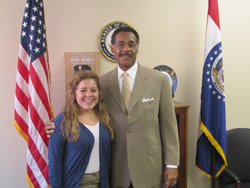| |  | | | | Congressional Delegation Announces Federal Funding for Jackson County
This afternoon, I was proud to announce, along with my colleagues Senators Claire McCaskill and Roy Blunt, that the United States Department of Transportation (DOT) and Federal Highway Administration (FHWA) have awarded Jackson County a $652,200 competitive federal grant to study a transportation corridor in south Kansas City. In addition to this grant, $600,000 will be used to improve Cliff Drive.
This project reflects a coordinated regional approach to assess the costs and benefits associated with rapid rail transit, leverage prior local, state, and federal investments, and advance the livability outcomes for communities within the Fifth District. I am happy to see the funds being awarded to Jackson County, and I know this grant will yield dividends for all of us in the Fifth District.
The grant funds will be used to conduct a transportation alternative analysis in the U.S. 71 Highway commuter corridor including Kansas City and Grandview in Jackson County and Raymore and Belton in Cass County.
Jackson County, in partnership with the Mid-America Regional Council, Kansas City, Missouri and the Kansas City Area Transportation Authority is currently conducting a similar study on two other corridors including I-70 between downtown Kansas City and Odessa and the Rock Island Railroad between downtown Kansas City and Pleasant Hill. Funds for this study were received last December.
The FHWA received more than 1800 applications for funding from 14 different grant programs. Requests for these funds came from every state as well as Puerto Rico and Washington D.C.
The "Alternatives Analysis" is a necessary step in the process of applying for and receiving federal transportation dollars which lead to the construction of new transit systems.
A Green Grant for a Local Company
This past Wednesday, U.S. Energy Secretary Steven Chu today announced more than $175 million over the next three to five years to accelerate the development and deployment of advanced vehicle technologies. The funding will support 40 projects across 15 states and will help improve the fuel efficiency of next generation vehicles. Our own Dow Kokam out of Lee's Summit, MO received one of these grants for $4,986,984. Located in western Missouri, near Kansas City, the Dow Kokam Lee's Summit Battery Park has approximately 33mWh capacity for battery cell and pack manufacturing. This money will be used to develop and deliver low cost, large format cells with extremely high energy density, that meet performance, life, and safety requirements of electric drive vehicles.
 | | A photo from Lee's Summit Battery Park, located in western Missouri, near Kansas City |
All of the projects will target new innovations throughout the vehicle, including better fuels and lubricants, lighter weight materials, longer-lasting and cheaper electric vehicle batteries and components, more efficient engine technologies, and more. This comprehensive approach to vehicle efficiency research and development will help ensure the technologies are available to help automakers achieve recently announced fuel efficiency standards.
Last month, the President announced historic fuel efficiency standards for cars and light trucks which will bring fuel efficiency to 54.5 miles per gallon by Model Year 2025 and which, combined with steps already taken by this administration, will save American families $1.7 trillion at the pump and reduce oil consumption by 12 billion barrels by 2025. Last week, the Administration announced first-of-their-kind fuel-efficiency standards for work trucks, buses and other heavy-duty vehicles, which will save American businesses who operate and own these commercial vehicles approximately $50 billion in fuel costs over the life of the program.
Read the full list of award winners. For more information, visit the DOE's Office of Energy Efficiency and Renewable Energy, which currently supports research in electric drive vehicle systems, advanced combustion engines, materials technologies, fuels and lubricants, energy storage, and automotive electronics. The selected projects address key technology barriers to improving vehicle fuel economy, such as lowering the cost of lightweight materials.
The End of an Era
 | | Rep. Cleaver poses for a photograph with former House Page Amanda Trosen |
As you may have heard in the news, Speaker Boehner and Leader Pelosi have decided to eliminate the U.S. House of Representatives Page Program. This comes as a great disappoint to me, many of my colleagues, and the many who have benefitted from the program. Senator Daniel Webster appointed the first Senate page in 1829, and the first House pages began their service in 1842. A female House page first served in 1939, although women didn't formally become part of the program until 1973. African-American teens were not allowed to become pages until the mid-1960s. Pages are appointed by a member or senator for one academic semester or a summer session. They are high-school juniors, and they must attend classes each weekday starting at 6:45 a.m. before heading to the Capitol. Pages live in Residence Hall, which is within walking distance of the building.
Amanda Trosen, currently a senior at Blue Springs High School, represented Missouri as a Congressional page. Amanda told me firsthand of her invaluable experience of serving as a page. "House leadership announced that they are cutting the congressional page program," she said, in a recent article. "Along with the 120 pages I served with over the past year, I feel devastated that no one will ever again get to witness history in the making from the perspective of a page."
Many of the students who come here to serve have never ventured outside of their hometowns. The opportunity to work for Congress, live steps from the Capitol building, and gain first-hand experience with our country's legislative process is unlike any other. It would be a shame if we take this opportunity away from our youth.
Speaker Boehner and Leader Pelosi cite budgetary constraints and changes in technology as reasons for eliminating the program. While I understand the need to cut back, ending the page program entirely goes too far. There are ways to reduce the cost of the program, as well as opportunities to expand the role and duties of House pages, that should be considered before we cancel it completely. The letter my colleagues and I sent is below.
Dear Speaker Boehner and Leader Pelosi:
We write to you today to express our deep concern over the decision to eliminate the U.S. House of Representatives Page Program. Pages have been an integral part of the legislative process dating back to the First Constitutional Convention, and it is a mistake to end the program rather than making changes to bring down the costs and expand the role of pages.
While we understand the need to cut our expenses in Washington, eliminating the page program will harm the institution of Congress as a whole. There are ways we can reduce the cost of the program without ending it completely. For example, the salary each page receives could be reduced or eliminated. Many students come to Washington for the learning experience, and would gladly do so without compensation. We would be pleased to discuss this as well as other measures aimed at reducing the costs associated with the page program.
You cited changes in technology as a reason for your decision to end the program. While it is true that pages are no longer called upon to physically deliver messages in the digital age, the value of the program cannot be measured in the number of messages or flags delivered. The role of pages may have changed and will continue to change in the future, but this is not a sufficient reason to end their historical presence in our halls. Rather, we should find new ways to use their skills. Pages could be called on to assist offices with special projects, tours, and various other tasks. It would be a mistake to end the program rather than change the role of these students to fit the needs of Congress today.
We are disappointed that we were not brought to the table to give our input on this decision. This is a significant change to the traditions of the House of Representatives, and we would have welcomed the opportunity to discuss ways to improve and reduce the costs of the page program.
We firmly believe that the U.S. House of Representatives Page Program remains an asset to Congress. Former pages have gone on to become today's leaders, both in government and the private sector. It would be a shame to permanently take this opportunity away from our youth. Therefore, we urge you to reconsider your decision to end this valuable program. |
Follow me on Twitter!
You can now follow me @repcleaver. As always, I look forward to hearing from you.
Click here to add me >>> https://twitter.com/repcleaver

Emanuel Cleaver, II
Member of Congress
| |
|
|  |
| Kansas City Office
101 W 31st St.
Kansas City, MO 64108
Phone: 816-842-4545
Fax: 816-471-5215 | Independence Office
211 West Maple Avenue
Independence, MO 64050
Phone: 816-833-4545
Fax: 816-833-2991 | Washington Office
1433 Longworth HOB
Washington, D.C. 20515
Phone: 202-225-4535
Fax: 202-225-4403
|
|
|
| |
| | |
|